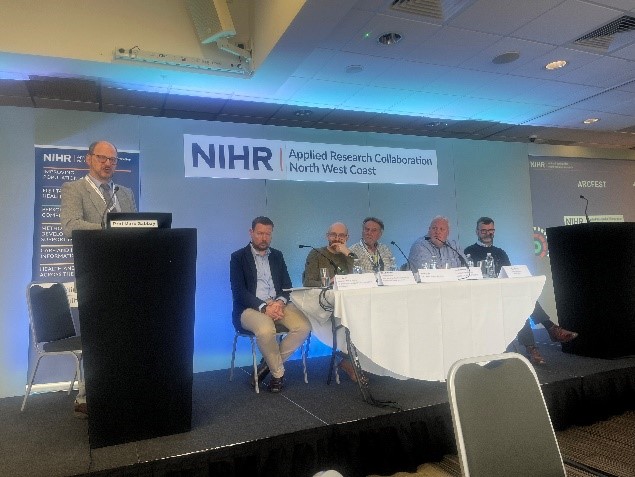Scoring Big on Health as ARC NWC’s Summer ARCFEST Triumphs at Mazuma Stadium

June 11th, 2024, in the heart of the coastal town Morecambe’s beloved Mazuma Stadium, the ARC NWC’s Summer hybrid ARCFEST event brought together leading minds in healthcare, research, and community well-being to explore health inequalities in unplanned care.
The day was packed with insightful presentations, robust discussions, and collaborative workshops, all aimed at tackling pressing health issues and pioneering innovative solutions to reduce health inequalities.
The event kicked off with Professor Mark Gabbay, the Director of ARC NWC, ceremoniously welcoming everyone and introducing the stellar panel consisting of Andy Curran, Associate Medical Director, NHS Lancashire and South Cumbria Integrated Care Board; ARC NWC Public Adviser Keith Holt; Mark Buchanan, Consultant in Emergency Medicine at Arrowe Park Hospital; Dale Kirkwood, Emergency Doctor and North West Secure Data Environment Public Engagement and Strategy Coordinator; and Tony Marson, ARC NWC Person-Centred Complex Care Theme Lead and Professor of Neurology at Walton Centre, who guided the mornings discussions.
The event quickly moved into its first half with a presentation on “Accident & Emergency and Health Inequalities” by key note speaker Andy Curran. His insights into the disparities in emergency healthcare received enthusiastic applause and was met with an array of thought-provoking questions.
Dr. Pooja Saini and Dr. Molly McCarthy from ARC NWC member organisation Liverpool John Moores University presented important findings from their qualitative study on emergency department pathways for individuals in suicidal crisis. The depth of their research sparked a profound discussion, illuminating the urgent need for enhanced care pathways.
Next up, Alex Blomfield from The Bay & Morecambe Eden Project presented “The Bay: A Blueprint for Recovery,” highlighting a person-centred approach to well-being through nature. This session underscored the therapeutic benefits of nature in recovery processes, resonating deeply with the audience.
Post-break, the spotlight turned to Sandra Smith, ARC NWC Public Adviser Co-Lead for the ARC NWC person centred Complex Care Theme, who conducted a hands-on workshop on palliative care pathways aimed at avoiding unnecessary A&E admissions. This practical session provided valuable takeaways for healthcare providers.
Professor Tony Marson and Dr. Adam Noble then delved into a mixed-method study on suspected seizures in care homes, offering a fresh perspective on emergency care protocols. Their findings were met with intrigue and critical questioning, highlighting the collaborative spirit of the event.
The stadium’s marketplace came alive during the lunch break, with various stalls showcasing innovative healthcare solutions and examples of ARC NWC research and opportunities. Attendees eagerly explored the displays, gathering information and forging new connections.
Professor Dame Caroline Watkins took the stage post-lunch, presenting the NIHR INSIGHT Programme, which aims to bolster research capacity in the regional workforce. Her session was a call to action for aspiring researchers.
Following this, Sam Meredith and Courtney Franklin, PhD students from ARC NWC, presented their respective systematic reviews on multimorbidity and inequalities in paediatric emergency care. Their enthusiasm and cutting-edge research brought engaging energy to the afternoon sessions.
Attendees were then inspired by a presentation from Claire Niebieski and Carl Grace from NHS Lancashire & South Cumbria Integrated Care Board. They discussed the integration of voluntary organizations into the health service, showcasing “The Well Communities” as a model for improving population health across North Lancashire.
The event also shone a spotlight on three significant studies from Hooi-Ling Harrison, Consultant in Emergency Medicine at University Hospitals of Morecambe Bay, presented an audit of high-intensity users in AED, offering crucial insights into managing frequent emergency department visits.
Alex Garner, a PhD student from Lancaster University, and Dr. Pooja Saini discussed the positive effects of the HOPE initiative on reducing hospital admissions for self-harm across Liverpool.
Anita Hansen, Research Matron at Liverpool University Hospitals NHS Foundation Trust, introduced the SJS Passport, highlighting its potential to prevent hospital admissions from becoming more complex.
As the final whistle blew, attendees left the Mazuma Stadium not just with new knowledge, but with a sense of community and a shared commitment to explore health inequalities in unplanned care within health and social care.
Slides and presentations can be found here: Presentations – NIHR
All presentations from the day can be found in video format here: https://youtu.be/-WxwGownq3I?si=02PGDydWIgPLcOdC
Our next ARCFEST will take place on September 11th, details to follow.